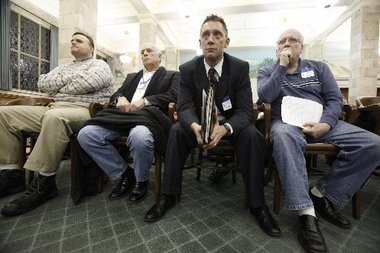By Matt Friedman
NJ.com
December 10, 2010
http://www.nj.com/news/index.ssf/2010/12/victims_to_testify_in_support.html
 |
| Supporters of Bill S-2405 (L-R) Clarks Cotton, form Mendham, Fred Marigliano, from Green Brook, Rhett Hackett, From Sayerville and Julian Colella, form Williamstown, listen as the Senate judiciary committee considers sex abuse victims bill, which removes the statute of limitations in civil actions for sexual abuse and expands the categories of persons who are potentially liable in such actions. |
After three hours of testimony from childhood sexual abuse victims, legal experts and a representative of the New Jersey Catholic Conference, a Senate panel approved a bill today that would give those who were molested as children more time to sue their abusers and the institutions that harbored them.
The bill (S2405), which cleared the Senate Judiciary Committee 9-0, would repeal the stateís two-year statute of limitations on lawsuits for child sexual abuse. Currently, adult victims of the childhood abuse have two years to bring suit from the point when they realize it damaged them.
The billís sponsor, Sen. Joseph Vitale (D-Middlesex), called it "the final chapter to trying to bring final justice for those victims."
The bill would also expand who could be held liable for doing nothing to stop abuse, from only parents and guardians to anyone in a supervisory role or position of authority over the victim ó which would include clergy and educators.
There are movements across the country to repeal or change statutes of limitations for civil cases involving childhood sexual abuse. Alaska, Delaware, Maine and Florida have eliminated theirs. Representatives of the Catholic Church have fought the changes, and recently helped sink an effort to ease Connecticutís 30-year statute of limitations.
"How can an institution conceivably defend itself against a claim that is 40, 50 or 60 years old when the alleged perpetrator is deceased and those responsible for supervision and oversight are long dead?" said Patrick Brannigan, executive director of the New Jersey Catholic Conference.
Another critic of the bill, American Tort Reform Association attorney Cary Silverman, suggested either lengthening the statute of limitations or removing it only for the abusers.
"The way this current bill is written, we believe the bulk of the liability will fall on the non-profits and businesses that serve children rather than the perpetrators, who most likely donít have the money to pay," he said.
But Marci Hamilton, a professor of constitutional law at Benjamin N. Cardozo School of Law, stressed Branniganís argument ignores that the burden of proof remains the same in the cases, no matter how long ago the alleged abuse took place.
"All this bill does is give the victim an opportunity to walk through the door," she said.
Several victims of sexual abuse by clergy and neighbors gave emotional testimony about their experiences.
Keith Brennan spoke publicly for the first time about his abuse as a teenager by a priest and a music director in his Jersey City church decades ago.
"The cost in my life has been high," said Brennan, 48, who said more than 150 instances of abuse led to "depression, ticks, nightmares, anxiety, panic attacks, self-mutilation," obsessive compulsive disorder, an eating disorder and intimacy issues early on in his marriage.
Brennan said he filed suit ó after the two-year deadline ó against the Roman Catholic Archdiocese of Newark, which he said settled out of court.
"I clearly did not have a case," said Brennan. "I remembered everything, and thatís what bothered them. For other people, thatís not the case. Thatís why I came (to testify)."
Any original material on these pages is copyright © BishopAccountability.org 2004. Reproduce freely with attribution.